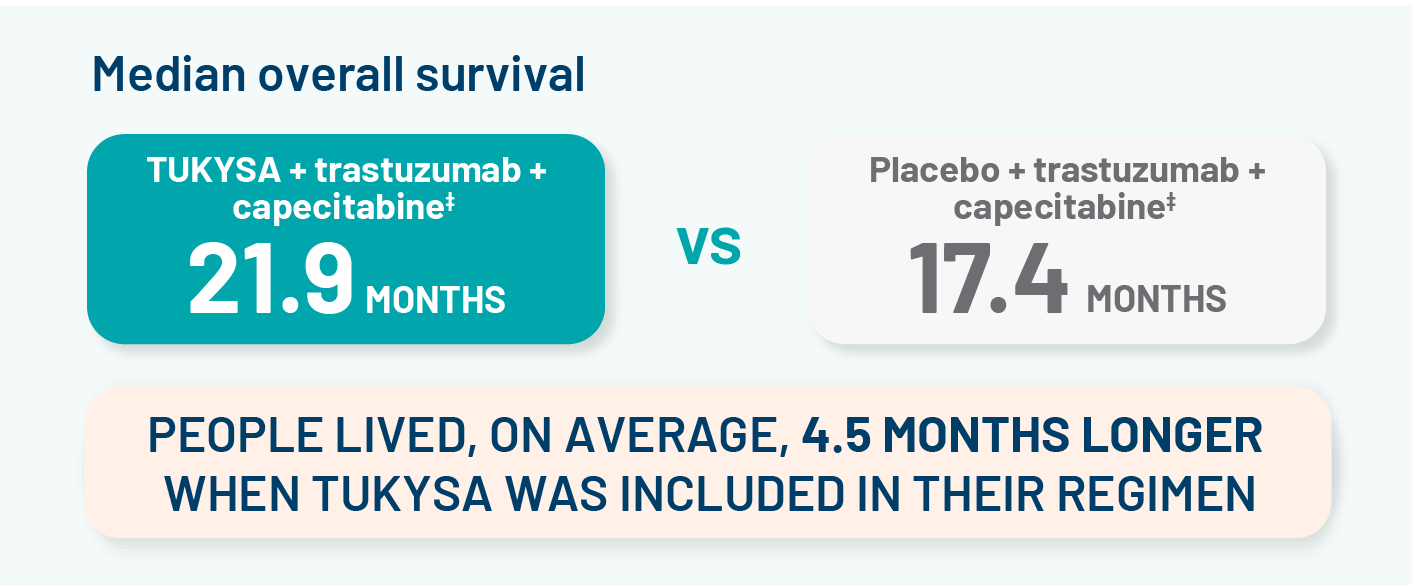INDICATION:
What is TUKYSA? TUKYSA is a prescription medicine used to treat adults with:
- a type of breast cancer called human epidermal growth factor receptor-2 (HER2) positive breast cancer. TUKYSA is used with the medicines trastuzumab and capecitabine, when your cancer has spread to other parts of the body such as the brain (metastatic), or cannot be removed by surgery, and you have received one or more anti-HER2 breast cancer treatments.
- a type of colorectal cancer called RAS wild-type HER2 positive colorectal cancer. TUKYSA is used with the medicine trastuzumab, when your cancer has spread to other parts of the body (metastatic), or cannot be removed by surgery, and you have received treatment with fluoropyrimidine-, oxaliplatin-, and irinotecan-based chemotherapy and it did not work or is no longer working. This use is approved based on a clinical study that measured how many patients had a tumor response and how long that response lasted. Studies are ongoing to confirm the benefit of TUKYSA for this use.
It is not known if TUKYSA is safe and effective in children.
What is TUKYSA? TUKYSA is a prescription medicine used with the medicines trastuzumab and capecitabine to treat adults with human epidermal growth factor receptor-2 (HER2) positive breast cancer that has spread to other parts of the body such as the brain (metastatic), or that cannot be removed by surgery, and who have received one or more anti-HER2 breast cancer treatments. It is not known if TUKYSA is safe and effective in children.
What is TUKYSA? TUKYSA is a prescription medicine used with the medicine trastuzumab to treat adults with RAS wild-type human epidermal growth factor receptor-2 (HER2) positive colorectal cancer that has spread to other parts of the body (metastatic), or cannot be removed by surgery, and who have received treatment with fluoropyrimidine-, oxaliplatin-, and irinotecan-based chemotherapy and it did not work or is no longer working. This use is approved based on a clinical study that measured how many patients had a tumor response and how long that response lasted. Studies are ongoing to confirm the benefit of TUKYSA for this use. It is not known if TUKYSA is safe and effective in children.


As demonstrated in the HER2CLIMB study
The TUKYSA Regimen* Offered Adults Living With HER2+ Metastatic Breast Cancer More Time
On this page, you can learn more about:
- How TUKYSA works
- How TUKYSA was studied in HER2CLIMB
- Learn more about treatment with TUKYSA
- Results in the HER2CLIMB study
Target HER2 in 2 Ways
You may have taken trastuzumab before. But when TUKYSA is taken with
trastuzumab, they work together to offer another chance to slow the
progression of cancer and may help you live longer.
Both TUKYSA and trastuzumab are designed to target HER2, but they do
it in different ways. More than either therapy alone, TUKYSA and
trastuzumab in combination may work together to more completely block
the signal that tells cancer cells to grow.
HER2 is also found on normal cells. This means HER2-targeted therapies
can affect normal cells and cause side effects, some of which may be
serious.
TUKYSA (tucatinib) Was Evaluated in a Clinical Study Called HER2CLIMB
Who was in the study
Who was in the study

- Adults living with HER2+ breast cancer that could not be removed by surgery or had spread somewhere in the body such as their liver, lungs, bones, and/or brain
- Adults with different types of brain metastases, including those that were growing when the person entered the study
- Adults who had been previously treated with Herceptin® (trastuzumab), Perjeta® (pertuzumab), and Kadcyla® (ado-trastuzumab emtansine)
How many adults were in the study
How many adults were in the study

- 612 adults were enrolled in the study, of whom the first 480 were assessed for the primary endpoint of progression-free survival
- 48% (291 of the 612 adults) had brain metastases when they entered the study
- Among the adults with brain metastases:
- 40% had stable brain metastases, which means they were not growing or spreading
- 60% had active brain metastases, which means they were growing or spreading
The treatment they received
The treatment they received

- Adults were randomly assigned to a treatment group:
- 410 adults received treatment with TUKYSA, along with trastuzumab and capecitabine
- 202 adults received treatment with trastuzumab and capecitabine alone
The goal of the study
The goal of the study

- The study wanted to see how long TUKYSA stopped cancer from growing or spreading
- Results were reported in median months
- Median: The middle number in a group of numbers arranged from lowest to highest
As demonstrated in the HER2CLIMB study
The TUKYSA Regimen* Has Been Proven to Offer More Time Without the Cancer Growing or Spreading
- In the clinical study, the median amount of time people lived without cancer progressing was 7.8 months with TUKYSA, along with trastuzumab and capecitabine, versus 5.6 months with trastuzumab and capecitabine alone†
Median: The middle number in a group of numbers arranged from lowest to highest.
Over the course of the trial, the TUKYSA regimen* led to

In the HER2CLIMB Study, the TUKYSA Regimen* Helped People Live Longer

As a follow-up analysis, per protocol, a pre-specified analysis was performed 24 months after the last person was enrolled. Results depicted below from this follow-up analysis are exploratory. This means the study was not designed to find differences between the two groups at that time point. Please interpret with caution.

Overall survival: A measure of how long people live once starting a clinical study.


As demonstrated in the HER2CLIMB study
The TUKYSA Regimen* Offered More Time Without Cancer Growing or Spreading in People With Brain Metastases
- In the clinical study, the median amount of time that cancer did not grow or spread in people living with brain metastases was 7.6 months with TUKYSA (tucatinib), along with trastuzumab and capecitabine, versus 5.4 months with trastuzumab and capecitabine alone†
Median: The middle number in a group of numbers arranged from lowest to highest.
Over the course of the trial, the TUKYSA regimen* led to

Learn More About Treatment With TUKYSA in This Short Video
Transcript
NARRATOR:
Indication
What is TUKYSA?
TUKYSA is a prescription medicine used with the medicines trastuzumab and capecitabine to treat adults with human epidermal growth factor receptor-2 (HER2) positive breast cancer that has spread to other parts of the body such as the brain (metastatic), or that cannot be removed by surgery, and who have received one or more anti-HER2 breast cancer treatments.
It is not known if TUKYSA is safe and effective in children.
Important Safety Information
What are the possible side effects of TUKYSA?
TUKYSA may cause serious side effects, including:
• Diarrhea (watery, loose, or frequent stools)
is common and can sometimes be severe. Tell your healthcare
provider if you have a change in your bowel movements or severe
diarrhea. Severe diarrhea can cause a loss of too much body
fluids (dehydration), low blood pressure, kidney problems, and
death. Your healthcare provider may prescribe medicines to treat
your diarrhea during treatment with TUKYSA.
• Liver Problems, including severe cases. Your healthcare provider will test your blood to check your liver function before starting and every 3 weeks during treatment with TUKYSA, or as needed. Tell your healthcare provider right away if you have any signs and symptoms of liver problems including itching, yellowing of your skin or eyes, dark or brown urine (tea-colored), pain in the right upper stomach area (abdomen), feeling very tired, decreased appetite, or bleeding or bruising more easily than normal.
This is not all the Important Safety Information. Please see additional Important Safety Information at the end of this video.
Many people with breast cancer find that learning all they can about this disease and its treatment leads to better conversations with their healthcare providers.
This video focuses on metastatic breast cancer, which is breast cancer that has spread to other parts of the body—like the bones, lungs, liver, or brain.
Breast cancer is not only classified as hormone receptor-positive or -negative, but also HER2 positive or negative. These classifications are important when discussing treatment with your healthcare provider.
If you have HER2 positive disease, you may be taking medicines that target HER2 to keep your cancer from spreading further. Sometimes, even with treatment, breast cancer can continue to spread. If this happens, the TUKYSA regimen may be an option for you.
TUKYSA (also called tucatinib) is a prescription medicine that is part of a treatment regimen that includes trastuzumab and capecitabine and that is used to treat adults with HER2 positive breast cancer that has spread to other parts of the body such as the brain (metastatic), or that cannot be removed by surgery, and who have received one or more anti-HER2 breast cancer treatments.
PATIENT:
Why is TUKYSA taken as part of a regimen?
NARRATOR:
If you have HER2 positive metastatic breast cancer, it means there is more HER2 on the surface of the cancer cells than on healthy cells. That’s why targeting HER2 is one way of treating the cancer.
To better target HER2 positive cancer cells, TUKYSA is taken with trastuzumab, a medicine that targets these cells in a different way than TUKYSA. Trastuzumab targets HER2 from outside the cell.
TUKYSA is a smaller molecule than trastuzumab, so it is able to target HER2 from inside the cell. Together, TUKYSA and trastuzumab may work to more completely block the HER2 activity that tells cancer cells to grow.
HER2 is also found on normal cells. This means that HER2-targeted therapies such as TUKYSA can affect normal cells and cause side effects, some of which may be serious.
PATIENT:
How was TUKYSA studied?
NARRATOR:
TUKYSA was FDA approved based on results from a clinical study called HER2CLIMB. HER2CLIMB enrolled 612 adults with HER2 positive breast cancer that could not be removed by surgery or had spread somewhere in the body, such as their liver, lungs, bones, and or brain, and who had received one or more anti-HER2 breast cancer treatments.
HER2CLIMB was different from many other studies of breast cancer treatments because it included adults with different types of brain metastases, including brain metastases that were growing. Nearly half of the people in HER2CLIMB—48%—had brain metastases when they started the study.
In the clinical study, adults were given either TUKYSA, trastuzumab, and capecitabine or trastuzumab and capecitabine alone.
PATIENT:
Can the TUKYSA regimen give me more time?
NARRATOR:
HER2CLIMB looked at the ability of the TUKYSA regimen to give people more time without the cancer growing or spreading.
One of the ways the results of the study were measured was with a median. The median is the middle number in a group of numbers arranged from lowest to highest. It is also called the midpoint.
The TUKYSA regimen has been proven to offer more time without the cancer growing or spreading.
In HER2CLIMB, the median amount of time people lived without the cancer growing or spreading was 7.8 months with TUKYSA, along with trastuzumab and capecitabine, versus 5.6 months with trastuzumab and capecitabine alone.
Over the course of the trial, the TUKYSA regimen led to a 46% reduction in the chance of disease progression or death, compared to the control arm.
The median overall survival was 21.9 months with TUKYSA, along with trastuzumab and capecitabine, versus 17.4 months with trastuzumab and capecitabine alone.
About half of people lived 4.5 months longer when they were on the TUKYSA regimen.
A follow-up analysis was pre-planned and was carried out about 2 years after the last person was enrolled. A follow-up analysis is an extended period of time during which the patient’s health will continue to be monitored (even after the study ends). The results from this analysis are exploratory. An exploratory analysis is defined as the process of examining data to discover patterns and new insights.
It’s important to note that the study was not designed to find differences between the two groups at that time point. Please interpret with caution.
The median overall survival was 24.7 months with TUKYSA, along with trastuzumab and capecitabine, and 19.2 months with trastuzumab and capecitabine alone.
HER2CLIMB also looked at the ability of the TUKYSA regimen to stop cancer from growing or spreading in the 48% of people in the study with brain metastases.
In the clinical study, the median amount of time that cancer did not grow or spread in people living with brain metastases was 7.6 months with TUKYSA, along with trastuzumab and capecitabine versus 5.4 months with trastuzumab and capecitabine alone.
Over the course of the trial, the TUKYSA regimen led to a 52% reduction in the chance of disease progression or death for patients with brain metastases, compared to the control arm.
PATIENT:
What can I expect while taking the TUKYSA regimen?
NARRATOR:
Nearly everyone in the study had some side effects. 26% of people treated with TUKYSA along with trastuzumab and capecitabine had serious side effects. The most common serious side effects were diarrhea, vomiting, nausea, abdominal pain, and seizure.
The most common side effects of TUKYSA in combination with trastuzumab and capecitabine were diarrhea; rash, redness, pain, swelling, or blisters on the palms of your hands or soles of your feet; nausea; increased liver function blood tests; vomiting; mouth sores (stomatitis); decreased appetite; a low number of red blood cells (anemia); and rash.
These are not all the possible side effects of TUKYSA, and you may also get side effects from the other medicines taken with TUKYSA.
Some side effects can be serious or fatal. Be sure to tell your healthcare provider about any side effects you have. They may be able to help you find ways to manage them.
Your healthcare provider may change your dose of TUKYSA, temporarily stop, or permanently stop treatment with TUKYSA if you have certain side effects.
Many people taking cancer medicines are concerned about alopecia or hair loss. In the study, hair loss was not common in people in either of the 2 treatment groups. 4.7% of people treated with TUKYSA along with trastuzumab and capecitabine had hair loss versus 3.6% of people treated with trastuzumab and capecitabine alone.
TUKYSA may cause fertility problems in males and females, which may affect the ability to have children.
Talk to your healthcare provider if you have concerns about fertility.
PATIENT:
Starting the conversation about TUKYSA.
NARRATOR:
No matter where you are in managing HER2-positive metastatic breast cancer with your healthcare provider, learning about available treatments can help as you and your healthcare provider work together to make decisions about care.
Whether you’ve talked about TUKYSA before or not, the following questions can help with your next conversation.
PATIENT:
Is TUKYSA an option for me now or something that we might consider in the future?
How is TUKYSA different from other metastatic breast cancer medicines I’ve taken?
What should I do if I have side effects from the TUKYSA regimen?
Is there anything else I should know about taking TUKYSA?
NARRATOR:
Are you ready to start the conversation? Talk to your healthcare provider to see if TUKYSA may be an option for you.
Important Safety Information (continued)
What are the possible side effects of TUKYSA? (continued)
The most common side effects of TUKYSA in combination with trastuzumab and capecitabine in adults with HER2-positive breast cancer include:
• diarrhea
• rash, redness, pain, swelling, or blisters on the palms of your hands or soles of your feet
• nausea
• increased liver function blood tests
• vomiting
• mouth sores (stomatitis)
• decreased appetite
• a low number of red blood cells (anemia)
• rash
Your healthcare provider may change your dose of TUKYSA, temporarily stop, or permanently stop treatment with TUKYSA if you have certain side effects.
TUKYSA may cause fertility problems in males and females, which may affect the ability to have children. Talk to your healthcare provider if you have concerns about fertility.
These are not all the possible side effects of TUKYSA. Discuss side effects with your healthcare provider. You may report negative side effects to the FDA at 1-800-FDA-1088 or www.fda.gov/Safety/MedWatch.
What should I tell my healthcare provider before taking TUKYSA?
Before taking TUKYSA, tell your healthcare provider about all of your medical conditions, including if you:
• have liver problems.
• are pregnant or plan to become pregnant. TUKYSA can harm your unborn baby.
Females who can become pregnant: Your healthcare provider will do a pregnancy test before you start taking TUKYSA. Use effective birth control (contraception) during TUKYSA treatment and for 1 week after the last dose of TUKYSA. Tell your healthcare provider right away if you become pregnant or think you may be pregnant during treatment with TUKYSA.
Males with a female partner who can get pregnant: Use effective birth control during TUKYSA treatment and for 1 week after the last dose of TUKYSA.
• are breastfeeding (nursing) or plan to breastfeed. Do not breastfeed during treatment with TUKYSA and for 1 week after the last dose of TUKYSA.
Tell your healthcare provider about all the medicines you take, including prescription and over- the-counter medicines, vitamins, and herbal supplements. TUKYSA may affect the way your other medicines work, and other medicines may affect the way TUKYSA works. Keep a list of all the medicines you take and show it to your healthcare provider and pharmacist every time you get a new medicine.
Please see Important Facts about TUKYSA at TUKYSA.com.
Important Safety Information

What are the possible side effects of TUKYSA?
TUKYSA may cause serious side effects, including:
- Diarrhea (watery, loose, or frequent stools) is common and can sometimes be severe. Tell your healthcare provider if you have a change in your bowel movements or severe diarrhea. Severe diarrhea can cause a loss of too much body fluids (dehydration), low blood pressure, kidney problems, and death. Your healthcare provider may prescribe medicines to treat your diarrhea during treatment with TUKYSA.
- Liver Problems, including severe cases. Your healthcare provider will test your blood to check your liver function before starting and every 3 weeks during treatment with TUKYSA, or as needed. Tell your healthcare provider right away if you have any signs and symptoms of liver problems including itching, yellowing of your skin or eyes, dark or brown urine (tea-colored), pain in the right upper stomach area (abdomen), feeling very tired, decreased appetite, or bleeding or bruising more easily than normal.
The most common side effects of TUKYSA in combination with trastuzumab and capecitabine in adults with HER2-positive breast cancer include:
- diarrhea
- rash, redness, pain, swelling, or blisters on the palms of your hands or soles of your feet
- nausea
- increased liver function blood tests
- vomiting
- mouth sores (stomatitis)
- decreased appetite
- a low number of red blood cells (anemia)
- rash
The most common side effects of TUKYSA in combination with trastuzumab in adults with RAS wild-type HER2-positive colorectal cancer include:
- diarrhea
- tiredness
- rash
- nausea
- stomach-area (abdomen) pain
- infusion-related reactions
- fever
TUKYSA may cause fertility problems in males and females, which may affect the ability to have children. Talk to your healthcare provider if you have concerns about fertility.
These are not all the possible side effects of TUKYSA. Discuss side effects with your healthcare provider. You may report side effects to FDA at 1-800-FDA-1088 or www.fda.gov/Safety/MedWatch.
These are not all the possible side effects of TUKYSA. Discuss side effects with your healthcare provider. You may report negative side effects to the FDA at 1-800-FDA-1088 or www.fda.gov/Safety/MedWatch.

What should I tell my healthcare provider before taking TUKYSA?
Before taking TUKYSA, tell your healthcare provider about all of your medical conditions, including if you:
- have liver problems.
-
are pregnant or plan to become pregnant. TUKYSA can harm your unborn
baby.
Females who can become pregnant: Your healthcare provider will do a pregnancy test before you start taking TUKYSA. Use effective birth control (contraception) during TUKYSA treatment and for 1 week after the last dose of TUKYSA. Tell your healthcare provider right away if you become pregnant or think you may be pregnant during treatment with TUKYSA.
Males with a female partner who can become pregnant: Use effective birth control during TUKYSA treatment and for 1 week after the last dose of TUKYSA. - are breastfeeding (nursing) or plan to breastfeed. Do not breastfeed during treatment with TUKYSA and for 1 week after the last dose of TUKYSA.
Tell your healthcare provider about all the medicines you take, including prescription and over-the-counter medicines, vitamins, and herbal supplements. TUKYSA may affect the way your other medicines work, and other medicines may affect the way TUKYSA works. Keep a list of all the medicines you take and show it to your healthcare provider and pharmacist every time you get a new medicine.
REF-8290_FINAL_01/23
Indication
Indication

What is TUKYSA?
TUKYSA is a prescription medicine used with the medicine trastuzumab to treat adults with RAS wild-type human epidermal growth factor receptor-2 (HER2) positive colorectal cancer that has spread to other parts of the body (metastatic), or cannot be removed by surgery, and who have received treatment with fluoropyrimidine-, oxaliplatin-, and irinotecan-based chemotherapy and it did not work or is no longer working.
This use is approved based on a clinical study that measured how many patients had a tumor response and how long that response lasted. Studies are ongoing to confirm the benefit of TUKYSA for this use.
It is not known if TUKYSA is safe and effective in children.
Please see Important Facts about TUKYSA.
TUKYSA is a prescription medicine used to treat adults with:
- a type of breast cancer called human epidermal growth factor receptor-2 (HER2) positive breast cancer. TUKYSA is used with the medicines trastuzumab and capecitabine, when your cancer has spread to other parts of the body such as the brain (metastatic), or cannot be removed by surgery, and you have received one or more anti-HER2 breast cancer treatments.
-
a type of colorectal cancer called RAS wild-type HER2
positive colorectal cancer. TUKYSA is used with the medicine
trastuzumab, when your cancer has spread to other parts of the
body (metastatic), or cannot be removed by surgery,
and you have received treatment with
fluoropyrimidine-, oxaliplatin-, and irinotecan-based
chemotherapy and it did not work or is no longer working.
This use is approved based on a clinical study that measured how many patients had a tumor response and how long that response lasted. Studies are ongoing to confirm the benefit of TUKYSA for this use.
It is not known if TUKYSA is safe and effective in children.
Please see Important Facts about TUKYSA.
TUKYSA is a prescription medicine used with the medicines trastuzumab and capecitabine to treat adults with human epidermal growth factor receptor-2 (HER2) positive breast cancer that has spread to other parts of the body such as the brain (metastatic), or that cannot be removed by surgery, and who have received one or more anti-HER2 breast cancer treatments.
It is not known if TUKYSA is safe and effective in children.
Please see Important Facts about TUKYSA.
Important Safety Information
Important Safety Information and Indication
What are the possible side effects of TUKYSA?
TUKYSA may cause serious side effects, including:
- Diarrhea (watery, loose, or frequent stools) is common and can sometimes be severe. Tell your healthcare provider if you have a change in your bowel movements or severe diarrhea. Severe diarrhea can cause a loss of too much body fluids (dehydration), low blood pressure, kidney problems, and death. Your healthcare provider may prescribe medicines to treat your diarrhea during treatment with TUKYSA.
- Liver Problems, including severe cases. Your healthcare provider will test your blood to check your liver function before starting and every 3 weeks during treatment with TUKYSA, or as needed. Tell your healthcare provider right away if you have any signs and symptoms of liver problems including itching, yellowing of the skin or eyes, dark or brown urine (tea-colored), pain or discomfort in the right upper stomach area (abdomen), feeling very tired, decreased appetite, or bleeding or bruising more easily than normal.
What is TUKYSA?
TUKYSA is a prescription medicine used to treat adults with:
- a type of breast cancer called human epidermal growth factor receptor-2 (HER2) positive breast cancer. TUKYSA is used with the medicines trastuzumab and capecitabine, when your cancer has spread to other parts of the body such as the brain (metastatic), or cannot be removed by surgery, and you have received one or more anti-HER2 breast cancer treatments.
-
a type of colorectal cancer called RAS wild-type HER2
positive colorectal cancer. TUKYSA is used with the medicine
trastuzumab, when your cancer has spread to other parts of the
body (metastatic), or cannot be removed by surgery,
and you have received treatment with
fluoropyrimidine-, oxaliplatin-, and irinotecan-based
chemotherapy and it did not work or is no longer working.
This use is approved based on a clinical study that measured how many patients had a tumor response and how long that response lasted. Studies are ongoing to confirm the benefit of TUKYSA for this use.
It is not known if TUKYSA is safe and effective in children.
What is TUKYSA? TUKYSA is a prescription medicine used with the medicines trastuzumab and capecitabine to treat adults with human epidermal growth factor receptor-2 (HER2) positive breast cancer that has spread to other parts of the body such as the brain (metastatic), or that cannot be removed by surgery, and who have received one or more anti-HER2 breast cancer treatments. It is not known if TUKYSA is safe and effective in children.
What is TUKYSA? TUKYSA is a prescription medicine used with the medicine trastuzumab to treat adults with RAS wild-type human epidermal growth factor receptor-2 (HER2) positive colorectal cancer that has spread to other parts of the body (metastatic), or cannot be removed by surgery, and who have received treatment with fluoropyrimidine-, oxaliplatin-, and irinotecan-based chemotherapy and it did not work or is no longer working. This use is approved based on a clinical study that measured how many patients had a tumor response and how long that response lasted. Studies are ongoing to confirm the benefit of TUKYSA for this use. It is not known if TUKYSA is safe and effective in children.

What are the possible side effects of TUKYSA?
TUKYSA may cause serious side effects, including:
- Diarrhea (watery, loose, or frequent stools) is common and can sometimes be severe. Tell your healthcare provider if you have a change in your bowel movements or severe diarrhea. Severe diarrhea can cause a loss of too much body fluids (dehydration), low blood pressure, kidney problems, and death. Your healthcare provider may prescribe medicines to treat your diarrhea during treatment with TUKYSA.
- Liver Problems, including severe cases. Your healthcare provider will test your blood to check your liver function before starting and every 3 weeks during treatment with TUKYSA, or as needed. Tell your healthcare provider right away if you have any signs and symptoms of liver problems including itching, yellowing of your skin or eyes, dark or brown urine (tea-colored), pain in the right upper stomach area (abdomen), feeling very tired, decreased appetite, or bleeding or bruising more easily than normal.
The most common side effects of TUKYSA in combination with trastuzumab and capecitabine in adults with HER2-positive breast cancer include:
- diarrhea
- rash, redness, pain, swelling, or blisters on the palms of your hands or soles of your feet
- nausea
- increased liver function blood tests
- vomiting
- mouth sores (stomatitis)
- decreased appetite
- a low number of red blood cells (anemia)
- rash
The most common side effects of TUKYSA in combination with trastuzumab in adults with RAS wild-type HER2-positive colorectal cancer include:
- diarrhea
- tiredness
- rash
- nausea
- stomach-area (abdomen) pain
- infusion-related reactions
- fever
Your healthcare provider may change your dose of TUKYSA, temporarily stop, or permanently stop treatment with TUKYSA if you have certain side effects.
TUKYSA may cause fertility problems in males and females, which may affect the ability to have children. Talk to your healthcare provider if you have concerns about fertility.
These are not all the possible side effects of TUKYSA. Discuss side effects with your healthcare provider. You may report side effects to FDA at 1-800-FDA-1088 or www.fda.gov/Safety/MedWatch.
These are not all the possible side effects of TUKYSA. Discuss side effects with your healthcare provider. You may report negative side effects to the FDA at 1-800-FDA-1088 or www.fda.gov/Safety/MedWatch.

What should I tell my healthcare provider before taking TUKYSA?
Before taking TUKYSA, tell your healthcare provider about all of your medical conditions, including if you:
- have liver problems.
-
are pregnant or plan to become pregnant. TUKYSA can harm your
unborn baby.
Females who can become pregnant: Your healthcare provider will do a pregnancy test before you start taking TUKYSA. Use effective birth control (contraception) during TUKYSA treatment and for 1 week after the last dose of TUKYSA. Tell your healthcare provider right away if you become pregnant or think you may be pregnant during treatment with TUKYSA.
Males with a female partner who can become pregnant:
Males with a female partner who can get pregnant: Use effective birth control during TUKYSA treatment and for 1 week after the last dose of TUKYSA. - are breastfeeding (nursing) or plan to breastfeed. Do not breastfeed during treatment with TUKYSA and for 1 week after the last dose of TUKYSA.
Tell your healthcare provider about all the medicines you take, including prescription and over-the-counter medicines, vitamins, and herbal supplements. TUKYSA may affect the way your other medicines work, and other medicines may affect the way TUKYSA works. Keep a list of all the medicines you take and show it to your healthcare provider and pharmacist every time you get a new medicine.
REF-8273_FINAL_01/23

Indication
What is TUKYSA?
TUKYSA is a prescription medicine used to treat adults with:
- a type of breast cancer called human epidermal growth factor receptor-2 (HER2) positive breast cancer. TUKYSA is used with the medicines trastuzumab and capecitabine, when your cancer has spread to other parts of the body such as the brain (metastatic), or cannot be removed by surgery, and you have received one or more anti-HER2 breast cancer treatments.
-
a type of colorectal cancer called RAS wild-type HER2
positive colorectal cancer. TUKYSA is used with the medicine
trastuzumab, when your cancer has spread to other parts of
the body (metastatic), or cannot be removed by surgery,
and you have received treatment with
fluoropyrimidine-, oxaliplatin-, and irinotecan-based
chemotherapy and it did not work or is no longer working.
This use is approved based on a clinical study that measured how many patients had a tumor response and how long that response lasted. Studies are ongoing to confirm the benefit of TUKYSA for this use.
It is not known if TUKYSA is safe and effective in children.
Please see Important Facts about TUKYSA.

What is TUKYSA?
TUKYSA is a prescription medicine used with the medicines trastuzumab and capecitabine to treat adults with human epidermal growth factor receptor-2 (HER2) positive breast cancer that has spread to other parts of the body such as the brain (metastatic), or that cannot be removed by surgery, and who have received one or more anti-HER2 breast cancer treatments.
It is not known if TUKYSA is safe and effective in children.
Please see Important Facts about TUKYSA.

What is TUKYSA?
TUKYSA is a prescription medicine used with the medicine trastuzumab to treat adults with RAS wild-type human epidermal growth factor receptor-2 (HER2) positive colorectal cancer that has spread to other parts of the body (metastatic), or cannot be removed by surgery, and who have received treatment with fluoropyrimidine-, oxaliplatin-, and irinotecan-based chemotherapy and it did not work or is no longer working.
This use is approved based on a clinical study that measured how many patients had a tumor response and how long that response lasted. Studies are ongoing to confirm the benefit of TUKYSA for this use.
It is not known if TUKYSA is safe and effective in children.
Please see Important Facts about TUKYSA.
